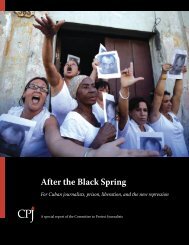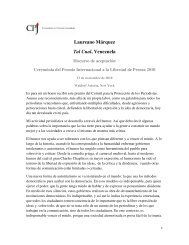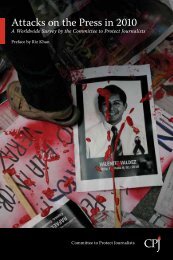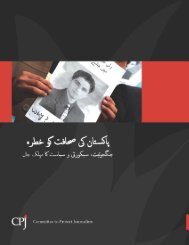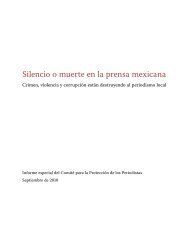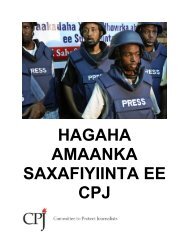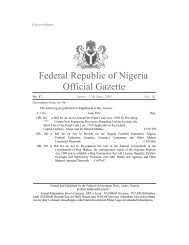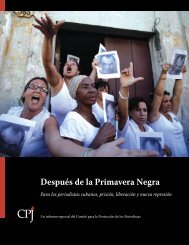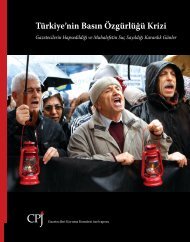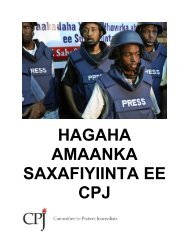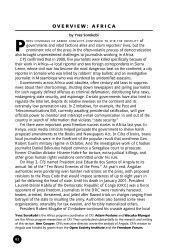Attacks on the Press - Committee to Protect Journalists
Attacks on the Press - Committee to Protect Journalists
Attacks on the Press - Committee to Protect Journalists
- No tags were found...
Create successful ePaper yourself
Turn your PDF publications into a flip-book with our unique Google optimized e-Paper software.
attacks <strong>on</strong> <strong>the</strong> press in 2009americas: brazilAmid <strong>the</strong> deteriorating climate, Clarín was subjected <strong>to</strong> a direct governmentattack. On September 11, about 200 tax agents raided <strong>the</strong> offices of <strong>the</strong>group’s newspaper, Clarín, after <strong>the</strong> paper ran a cover s<strong>to</strong>ry alleging <strong>the</strong> governmentimproperly granted a farm subsidy. Clarín and o<strong>the</strong>rs decried <strong>the</strong> raid asgovernment intimidati<strong>on</strong>. The tax agency immediately backpedaled, saying <strong>the</strong>raid was c<strong>on</strong>ducted in error and claiming <strong>to</strong> fire two officials for carrying out<strong>the</strong> acti<strong>on</strong>.The administrati<strong>on</strong> also claimed <strong>to</strong> be investigating who ordered <strong>the</strong> raid andwhy, but it disclosed no findings by late year. La Nación, citing tax agency documents,reported in December that Ricardo Echegaray, <strong>the</strong> agency’s direc<strong>to</strong>r, hadordered <strong>the</strong> raid and that <strong>the</strong> two officials were never actually dismissed. No governmenttax probe was ever carried out against Clarín.Clarín was targeted in ano<strong>the</strong>r episode with political overt<strong>on</strong>es. The Teamsters,headed by close administrati<strong>on</strong> ally Hugo Moyano, briefly blocked <strong>the</strong> distributi<strong>on</strong>of Clarín, La Nación, Perfil, and o<strong>the</strong>r newspapers in November, demandingthat <strong>the</strong> papers’ drivers be represented by <strong>the</strong> uni<strong>on</strong>. The newspapersand <strong>the</strong> publishers group Asociación de Entidades Periodísticas Argentinas complainedthat <strong>the</strong> uni<strong>on</strong>’s move was politically motivated.In November, in a major advance for press freedom, C<strong>on</strong>gress decriminalizedlibel and slander. The measure followed recommendati<strong>on</strong>s made by <strong>the</strong> Inter-American Court of Human Rights in a May 2008 ruling. The court, an arm of<strong>the</strong> Organizati<strong>on</strong> of American States, voided <strong>the</strong> 1999 criminal defamati<strong>on</strong> c<strong>on</strong>victi<strong>on</strong>of journalist and author Eduardo Kimel. The case stemmed from Kimel’sbook, La Masacre de San Patricio (The San Patricio Massacre), in which he criticizedan investigati<strong>on</strong> in<strong>to</strong> <strong>the</strong> 1976 slaying of five priests during <strong>the</strong> militarydicta<strong>to</strong>rship. The court also urged Argentine leaders <strong>to</strong> reform defamati<strong>on</strong> lawsin line with regi<strong>on</strong>al standards.<strong>Journalists</strong> and free press advocates also hailed a January ruling by a federalappeals court that found <strong>the</strong> government was improperly withholding state advertisingfrom publicati<strong>on</strong>s owned by <strong>the</strong> media group Edi<strong>to</strong>rial Perfil in retaliati<strong>on</strong>for its critical coverage of <strong>the</strong> Kirchner administrati<strong>on</strong>. The government appealed<strong>the</strong> decisi<strong>on</strong>, and <strong>the</strong> case was pending in late year.CPJ and o<strong>the</strong>r analysts have found that Kirchner, following a systeminstituti<strong>on</strong>alized during her husband’s presidency, has manipulated <strong>the</strong> distributi<strong>on</strong>of state advertising by withholding ads <strong>to</strong> critical media and rewardingfriendly outlets with government spots. Free press advocates havec<strong>on</strong>tended that manipulative government advertising violates Articles 14and 32 of <strong>the</strong> Argentine C<strong>on</strong>stituti<strong>on</strong>, which bar censorship and guaranteepress freedom, respectively; and Article 13 of <strong>the</strong> American C<strong>on</strong>venti<strong>on</strong> <strong>on</strong>Human Rights.BRAZILIn a major advance for press freedom, brazil’s highest courtstruck down a repressive 1967 law that criminalized broad swaths of sensitivereporting and set harsh potential penalties. But defamati<strong>on</strong> laws remained a c<strong>on</strong>cernas penal code provisi<strong>on</strong>s allowed pris<strong>on</strong> penalties for libel and slander. Anda flood of civil defamati<strong>on</strong> cases c<strong>on</strong>tinued unabated, in some cases leading lowercourts <strong>to</strong> issue censorship orders that barred news media from covering publicissues, including alleged corrupti<strong>on</strong> involving government officials and businesspeople.In April, <strong>the</strong> Supreme Federal Tribunal ruled that <strong>the</strong> 1967 <strong>Press</strong> Law, ananachr<strong>on</strong>istic remnant of <strong>the</strong> country’s military rule, violated c<strong>on</strong>stituti<strong>on</strong>al guaranteesof free expressi<strong>on</strong>. The court had earlier suspended 22 of <strong>the</strong> law’s 77articles pending its final ruling. CPJ and o<strong>the</strong>rs had campaigned against <strong>the</strong> law,arguing that it was inc<strong>on</strong>sistent with regi<strong>on</strong>al standards for free expressi<strong>on</strong>. Thepress law defined violati<strong>on</strong>s in sweeping terms that included reporting deemedoffensive <strong>to</strong> public morals; reporting a plaintiff found damaging <strong>to</strong> his reputati<strong>on</strong>or offensive <strong>to</strong> his dignity; reporting <strong>the</strong> government deemed subversive; andreporting of “true” facts that might be c<strong>on</strong>sidered dis<strong>to</strong>rted or provocative. Italso allowed authorities<strong>to</strong> censor media outletsand writers, seize publicati<strong>on</strong>s,and impose pris<strong>on</strong>terms of up <strong>to</strong> threeyears for violati<strong>on</strong>s.The high court’s decisi<strong>on</strong>bolstered a growingbody of internati<strong>on</strong>al legalopini<strong>on</strong> that civil remediesprovide adequateredress for press offenses.In a landmark 2004 decisi<strong>on</strong>,<strong>the</strong> Inter-Americant o p developments»»Judges in defamati<strong>on</strong> cases issue sweepingcensorship orders.»»Ex-police officers c<strong>on</strong>victed in abducti<strong>on</strong>,<strong>to</strong>rture of O Dia journalists.44key statisticDefamati<strong>on</strong> lawsuits filed by a singlec<strong>on</strong>gressman. Complaints targetdozens of journalists for critical coverage.Court of Human Rights, <strong>the</strong> legal arm of <strong>the</strong> Organizati<strong>on</strong> of American States,said that critics of public officials must have “leeway in order for ample debate <strong>to</strong>take place <strong>on</strong> matters of public interest.” Laws that criminalize speech are incompatiblewith <strong>the</strong> rights established under Article 13 of <strong>the</strong> American C<strong>on</strong>venti<strong>on</strong><strong>on</strong> Human Rights, which Brazil has ratified. As <strong>the</strong> Inter-American Commissi<strong>on</strong><strong>on</strong> Human Rights stated in 1994: “C<strong>on</strong>sidering <strong>the</strong> c<strong>on</strong>sequences of criminalsancti<strong>on</strong>s and <strong>the</strong> inevitable chilling effect <strong>the</strong>y have <strong>on</strong> freedom of expressi<strong>on</strong>,7 07 1




